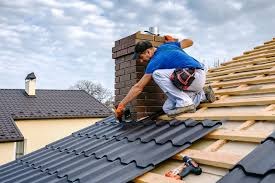Residential Roofing Solutions: Finding the Best Fit for Your Home

When it comes to protecting your home from the elements, your roof plays an essential role. Not only does it safeguard your property, but it also contributes to your home’s overall appearance and value. Selecting the right roofing material and design is critical to ensure long-term protection, durability, and aesthetic appeal.
In this article, we will explore various residential roofing options, discuss the factors to consider when choosing the best fit for your home, and highlight how investing in quality roofing solutions can ensure peace of mind for years to come.
Popular Roofing Materials: Weighing Your Options
When choosing the right roofing material, several factors come into play, such as the climate, architectural style, and budget. Below are some of the most popular residential roofing materials to consider:
1. Asphalt Shingles
Asphalt shingles are by far the most common roofing material in residential homes. They are affordable, easy to install, and come in a variety of colors and styles, making them a versatile choice for homeowners. Asphalt shingles typically last between 20 and 30 years, providing a reliable option for those on a budget.
While asphalt shingles are cost-effective, they may require more frequent maintenance or replacement compared to more durable materials, especially in harsh weather conditions.
2. Metal Roofing
For homeowners seeking durability and longevity, metal roofing is an excellent option. Metal roofs can last 40 to 70 years, depending on the type of metal used. They are highly resistant to wind, rain, and fire, making them ideal for homes in regions with extreme weather.
In addition to their durability, metal roofs are eco-friendly, as they are often made from recycled materials and can be fully recycled at the end of their lifespan. They also reflect heat, making them energy-efficient and helping to reduce cooling costs in warmer climates.
3. Clay or Concrete Tiles
Clay and concrete tiles are known for their durability and aesthetic appeal, particularly in Mediterranean or Spanish-style homes. These materials can last up to 50 years or more and are highly resistant to fire and moisture. Clay and concrete tiles provide excellent insulation and are well-suited to warm climates.
However, they are heavier than other roofing materials, so it’s essential to ensure that your home’s structure can support the additional weight. While clay and concrete tiles come with a higher upfront cost, their long lifespan makes them a worthwhile investment.
4. Wood Shingles and Shakes
For homeowners seeking a natural, rustic look, wood shingles and shakes offer a unique aesthetic. Wood shingles are cut to provide a smooth, uniform appearance, while wood shakes are hand-split, giving them a more textured and rugged look.
While wood roofing materials are beautiful, they do require regular maintenance to prevent rot, mold, and insect damage. They are also more susceptible to fire, making them less ideal for homes in fire-prone areas. However, with proper care, wood shingles and shakes can last 30 to 40 years.
5. Slate Roofing
Slate roofing is one of the most durable and long-lasting roofing materials available, with a lifespan of over 100 years. Made from natural stone, slate offers a timeless, elegant look that can elevate the appearance of any home. Slate is highly resistant to fire, water, and weather damage, making it an ideal choice for homeowners seeking long-term durability.
The main drawback of slate roofing is its weight and cost. Slate is one of the heaviest roofing materials, requiring reinforced structural support, and it is also one of the most expensive options on the market.
Factors to Consider When Choosing Your Roof
Choosing the right roofing material for your home goes beyond aesthetics. It’s essential to weigh several factors to ensure you make the best decision for your needs and budget:
1. Climate and Weather Conditions
The local climate plays a significant role in determining the best roofing material for your home. For example, if you live in an area prone to heavy rainfall, snow, or wind, materials like metal roofing or clay tiles, which are highly resistant to extreme weather, may be the most suitable option.
In warmer climates, energy efficiency should also be a consideration. Roofing materials that reflect heat, like metal or clay, can help keep your home cooler and reduce energy costs.
2. Maintenance Requirements
Each roofing material has different maintenance needs. Asphalt shingles, for example, require occasional repairs or replacement over time, while slate or metal roofs may require minimal maintenance. Consider how much time and effort you are willing to invest in maintaining your roof, as this can influence your choice of material.
For homeowners who prefer a low-maintenance option, materials like metal or clay tiles offer long-lasting durability with minimal upkeep.
3. Longevity and Durability
Investing in quality roofing services is important to ensure your roof lasts as long as possible. The longevity of your roof depends largely on the material you choose. While asphalt shingles may need to be replaced after 20 to 30 years, materials like metal, clay, and slate can last much longer.
It’s essential to consider the long-term benefits of a durable roof, especially if you plan to stay in your home for many years. Opting for a longer-lasting material may save you money in the long run by reducing the need for frequent repairs or replacements.
4. Aesthetic Appeal
Your roof is a visible part of your home’s exterior, and its appearance can significantly impact your home’s curb appeal. Consider how the roofing material complements the architectural style of your home. For example, clay tiles are a natural fit for Mediterranean-style homes, while metal roofing works well with modern or industrial designs.
Don’t underestimate the importance of choosing a material and color that enhances the overall look of your home.
5. Budget
Budget is always a key consideration when choosing roofing materials. While asphalt shingles are the most affordable option, materials like slate and metal come with a higher upfront cost but offer greater durability and longevity. It’s important to weigh the initial costs against the long-term benefits to make an informed decision.
When budgeting for your roof, be sure to factor in installation costs as well. Some materials, like slate and clay tiles, require specialized installation, which may add to the overall cost.
The Importance of Professional Roofing Installation
No matter which roofing material you choose, proper installation is critical to ensuring its longevity and performance. A poorly installed roof can lead to leaks, water damage, and premature deterioration. Working with experienced professionals, like those at Mike Ragan Roofing, ensures that your roof is installed correctly and that your investment is protected.
Roofing professionals have the expertise to assess your home’s specific needs and recommend the best materials for your location and budget. They also have access to high-quality materials and tools, ensuring that your roof is built to withstand the elements for years to come.
Extending the Life of Your Roof with Regular Maintenance
Once your new roof is installed, regular maintenance is essential to keep it in good condition. Here are some simple maintenance tasks that can help extend the life of your roof:
- Inspect for damage: Regularly check for missing or damaged shingles, cracks, or signs of wear. Addressing small issues early can prevent more significant problems down the line.
- Keep gutters clean: Clogged gutters can cause water to back up onto your roof, leading to leaks and water damage. Clean your gutters regularly to ensure proper drainage.
- Trim overhanging branches: Tree branches that hang too close to your roof can cause damage during storms. Trim back branches to prevent them from scraping against your roof.
By staying on top of these tasks, you can help protect your roof and maximize its lifespan.
Conclusion: Finding the Best Roofing Solution for Your Home
Choosing the right residential roofing solution requires careful consideration of various factors, from climate and budget to aesthetic preferences and long-term durability. By understanding the strengths and weaknesses of different roofing materials, you can make an informed decision that best fits your home’s needs.
Investing in high-quality roofing solutions not only enhances the appearance of your home but also ensures it remains protected for years to come. Whether you opt for asphalt shingles, metal roofing, or more durable options like slate or clay tiles, a well-chosen and professionally installed roof is one of the best investments you can make for your home.



